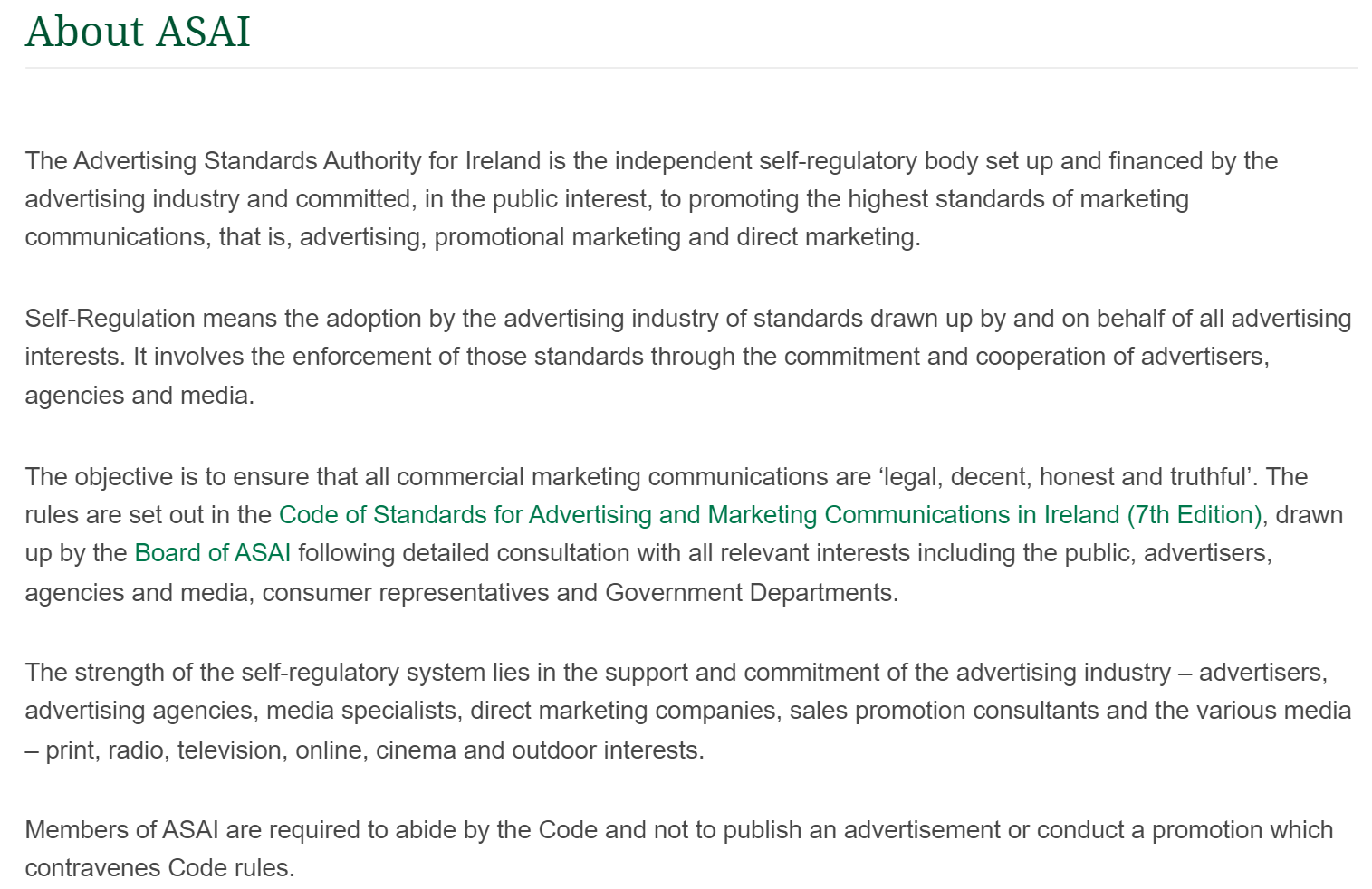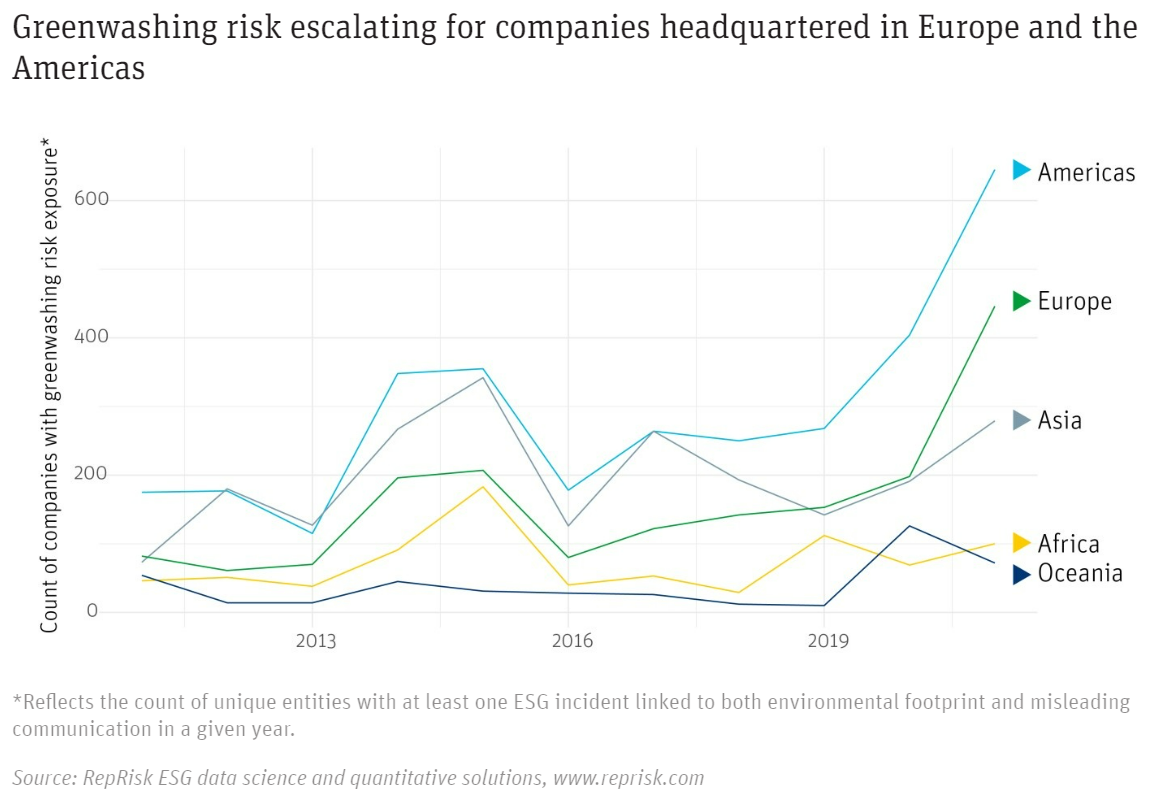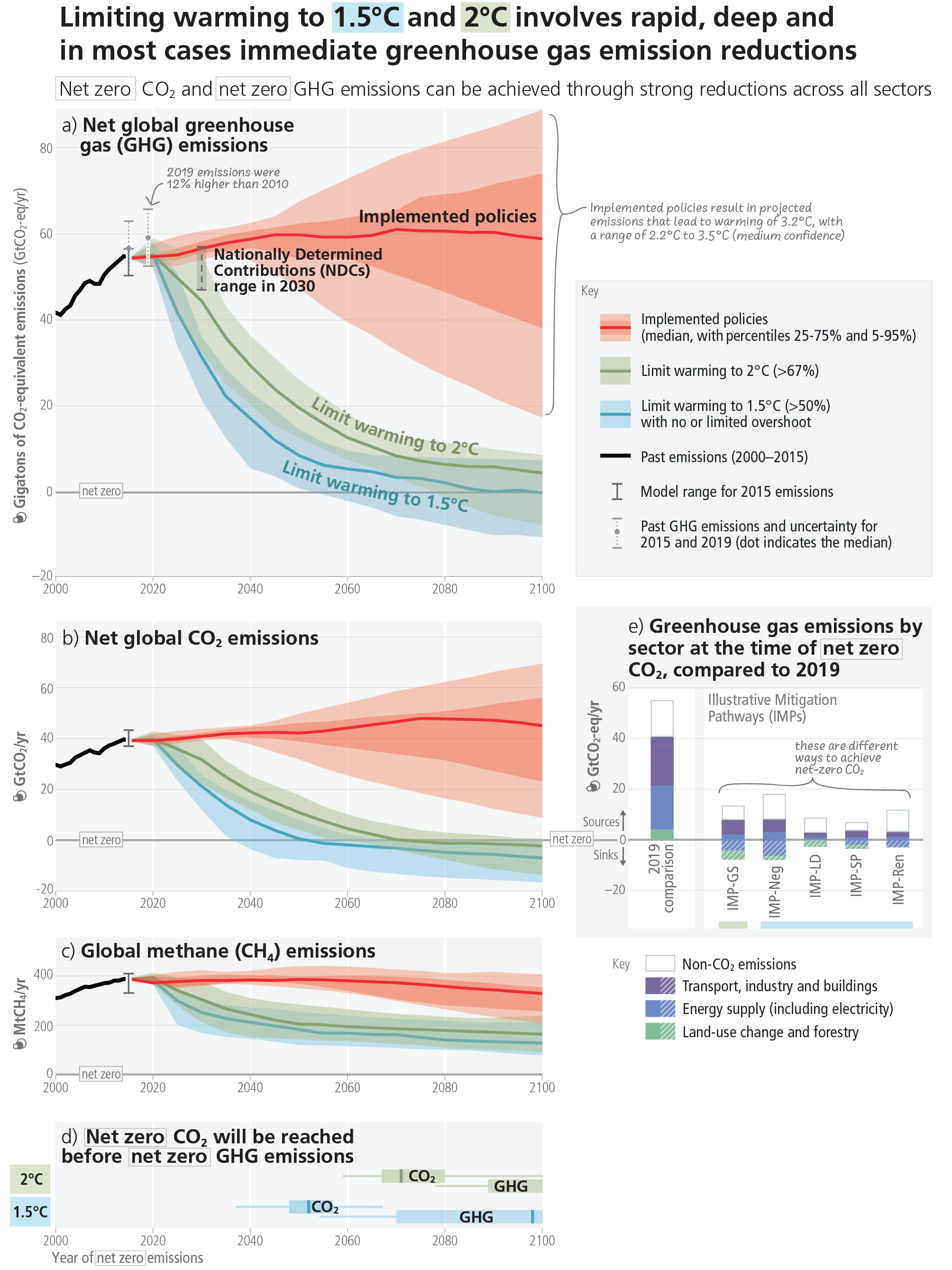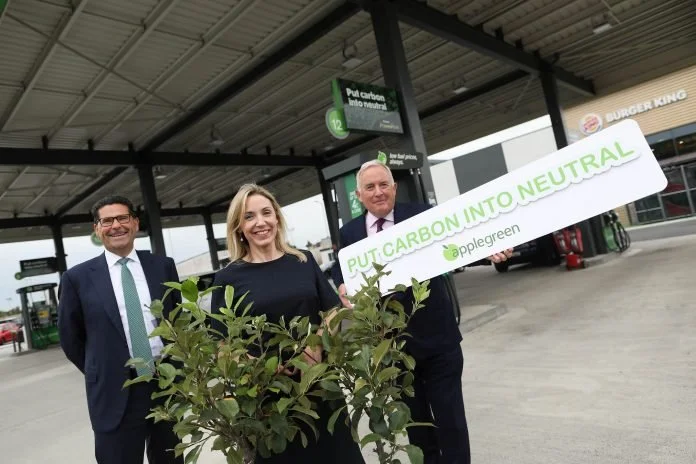
ASAI Unfit In The Face of Greenwashing
Greenwashing has rapidly become rampant across Ireland as brands and organisations deceive their customers with misinformation and misleading products that fail to deliver on ethical promises of sustainability.
From fuel to fashion, food to governmental action, greenwashing has become ubiquitous, empowering those with a vested interest in maintaining the status quo and sky-high profits to delay action in the face of the Climate Crisis.
The result is greater profits for them, increased costs for consumers, and maintaining emissions at a time when we urgently need to cut them if we are to avert the sixth mass extinction.
Today we look at the role that the Advertising Standards Authority of Ireland (ASAI) plays in both addressing and empowering greenwashing and why it isn’t fit for purpose in supporting consumer protection during the Climate Emergency.
What Is The ASAI?
The ASAI is an independent, self-regulating body that is financed by the advertising industry.
That sentence – taken from the ASAI’s own website – should already have alarm bells ringing for anyone interested in consumer protection or concerned about the rise of greenwashing.
The organisation tasked with judging whether an advert breaks ethical standards is itself funded by the advertising industry, and comprised of industry members. This is an immediate and concerning conflict of interest, and really emphasises that this is anything but an “independent” body.
The ASAI is financed by the advertising industry and says “The strength of the self-regulatory system lies in the support and commitment of the advertising industry”. This raises major concerns about transparency and trust. Credit: ASAI
Concerns of Transparency
With the rapid rise in greenwashing, we contacted the ASAI to ask about their approach to the issue, addressing specific examples where they had found such campaigns did not contravene their rules – particularly Applegreen’s notorious PowerPlus greenwashing campaign.
It took two months for the ASAI to reply to us, despite several follow-up emails. In their reply, they stated: “The Committee do not publish which members were present to preside over a determination and reach their determination on the factors under before them [sic].”
They then directed us to the conclusion published on their website – the very one that we were directly enquiring about due to its lack of transparency.
We found this response from the ASAI incredibly concerning – given that they had elected to respond to a legitimate enquiry about greenwashing and transparency so curtly. In effect, their response felt like a ‘f*** off’.
Outlining our lack of satisfaction in their response – particularly on such an important topic as greenwashing – we pushed back, asking the ASAI why it took so long to reply, whether they accepted that transparency was essential to gain the public’s trust that they were taking greenwashing seriously, and what it is doing to address issues of transparency and public recourse to overturn decisions about greenwashing campaigns.
Their response was as predictable as it was concerning.
Instances of greenwashing have increased dramatically in recent years, as corporations have evolved their greenwashing practices to be more deceptive in order to maintain profits and delay action on the carbon footprint and emissions of their products. Credit: RepRisk
While they stressed that the ASAI “operates in a totally transparent manner”, they still would not provide any detail on the expertise or conflict of interest of its members in making informed, unbiased decisions about greenwashing campaigns.
“The Committee do not publish which members were present to preside over a determination and reach their determination on the factors under before them. Their considerations of the complaint and ad content are reflected in their conclusion, and they apply their own discretion on what is appropriate or otherwise to include in their published determination”.
In short, ‘we make the rules and what we say goes’.
Perhaps the most concerning factor is that the ASAI are clear that any complaints will only be considered based on the specific terms, conditions and issues raised by the person making a complaint.
The ASAI’s spokesperson stated: “While we assess advertising as a whole and in context, a complaints investigation is based on the complaints made about the specific claims in the advertising. Both parties to the case have the opportunity to comment further on a draft case report before it is submitted to the Committee.”
In short, this means that any complaints about greenwashing are heavily stacked in favour of the advertiser, as the ASAI has confirms that the member of the public reporting a greenwashing advert must understand:
What greenwashing is, and fundamental climate science to ensure that they are making a detailed, reasoned and science-led case
Ensure that they list all specific terminologies and claims which constitute greenwashing – a failure to do so fully will mean that certain aspects will be overlooked by ASAI
They have a working understanding of the advertising industry and legislation, so that they can compete with the advertiser making the greenwashing claims when the draft case report is shared
Furthermore, they must have the time and commitment to dedicate themselves to upholding this fight.
This part is critical, as greenwashing itself prays on people who are time-poor, misleading them into buying more expensive products because they don’t have time or the resources to question the claims of the advertiser.
Similarly, in order to raise a complaint with the ASAI they must not be time-poor.
Of course, the advertisers understand all of this inherently – and have PR and legal teams to support where needed. Not to mention that the ASAI is a ‘self-regulating’ body that is comprised of advertisers – which raises necessary questions about transparency and a ‘you scratch my back, I’ll scratch yours’ environment.
Semantics & Loopholes
An RTE Prime Time investigation into the ASAI in June 2022 – which was supported by IrishEVs – reported that the standards agency had yet to define the term ‘carbon neutral’.
The term is at the forefront of many greenwashing campaigns, such as Applegreen’s PowerPlus fuel campaign, and the lack of a definition has enabled the forecourt operator to continue to mislead the public to this day.
This example is taken from the ASAI’s ruling on Applegreen’s PowerPlus campaign - a campaign that is clearly greenwashing. However, the ASAI ignored public complaints and have empowered Applegreen to continue misleading the public, worsening both public and planetary health. Credit: ASAI
As reported by RTE: “It (the ASAI) accepted Applegreen’s evidence that the use of the phrase ‘carbon-neutral driving’ did not mean it was a carbon neutral fuel.”
Except that is the crux of Applegreen’s whole greenwashing campaign. They claim that the fuel is carbon neutral and they are charging Irish people more money for a premium product that has nothing to support their highly misleading ‘green’ claims.
We cannot cut greenhouse gas emissions fast enough. We need mass education and mass action to avert the worst outcomes of the Climate Crisis, and we don’t have time to waste. Greenwashing squanders the little time we have to act. Credit: IPCC AR6
Transparency, Independence & Action
While we have seen some recent examples where the ASAI has blocked greenwashing campaigns, it is clear that there is a worrying lack of transparency in the current system, which is self-funding and self-regulating – which often translates into a lack of trust, particularly when so many greenwashing campaigns are still permitted.
Given the severity of the Climate Crisis that we already face – let alone what is yet to come – we urgently need a publicly-funded advertising standards body that prioritises the interests of Irish citizens, not the needs of advertisers.
Our recommendations are below – note that we are not legal or regulatory experts, but we are experts in the prevalence and damage of greenwashing:
The Irish Government should establish an independent auditor who would assess advertising, marketing and PR claims to see if they hold up under scrutiny for greenwashing, with the auditor making its own assessments, as well as undertaking investigations based on public submissions, and report its findings publicly.
Their findings should be reported in a fact-checking manner, laying out the claims and any evidence to support or contradict them in an accessible way that anyone without prior knowledge could understand – similar to the likes of Snopes.
They should be able to publicly issue updates that help people to understand which claims are greenwashing, and educate the public on why this is the case.
They should also have the power to discontinue greenwashing campaigns, and ensure that companies publicise that their campaign was deemed to be greenwashing on their website, social media channels and real-world locations. This is critical to raise public awareness and undo the lasting damage that can result from such campaigns.
Furthermore, the independent auditor should also be able to implement a financial penalty for any company making greenwashing claims, with increasing fines for repeat offenders to discourage them for repeatedly misleading the public.
As things stand, Irish people are worryingly exposed to greenwashing by corporations that are profiting from maintaining sky-high emissions and worsening the cost-of-living crisis through misinformation.
If we are to hit our emissions targets and ensure a just climate transition for all, we must have strengthened and transparent protections to turn the tide on greenwashing and stop the vast damage that it already does.
What To Read Next
Applegreen-Washing: Separating Action From Marketing Ploys
We investigate Applegreen's carbon offsetting claims to show why their PowerPlus campaign is pure greenwashing
There’s No Such Thing As ‘Clean’ Gas
The gas industry in Ireland is engaging in flagrant greenwashing to promote so-called ‘renewable’ gas as a 'clean' solution - when, in reality, it is worsening the Climate Crisis






